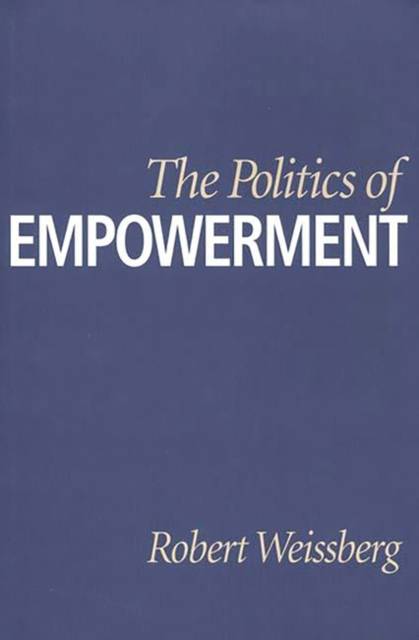
- Retrait gratuit dans votre magasin Club
- 7.000.000 titres dans notre catalogue
- Payer en toute sécurité
- Toujours un magasin près de chez vous
- Retrait gratuit dans votre magasin Club
- 7.000.0000 titres dans notre catalogue
- Payer en toute sécurité
- Toujours un magasin près de chez vous
Description
On today's menu of remedies for our social and economic ills, empowerment has become immensely popular. The scholarly literature abounds with it: computerized searches yield thousands of citations in myriad disciplines. The education profession seems intoxicated by it; it infuses the entire political spectrum--from Marxists to feminists, from Black Power advocates to conservatives. As Weissberg points out, all assume, typically with more hope than proof, that if only people seized control of their lives, betterment would surely ensue. Allegedly, empowerment will cure everything from personal disorders to declining city centers.
Weissberg conducts an FDA-like inquiry across numerous academic disciplines to assess the worthiness of this cure. He balances a close reading of the underlying theoretical foundations with empirically demonstrated effectiveness. Entire chapters are devoted to empowerment as a cure for personal problems ranging from health to homelessness, education, community development, and the problems afflicting African Americans. Despite all the promises, however, evidence of accomplishment is not forthcoming. Indeed, as Weissberg demonstrates, much of the evidence is twisted to disguise failure. Worse, much of this helpfulness is merely admonitions for greater dependency and misdirection away from cures of proven utility. Given that almost all this advice emanates from academics, the discrepancy between promise and result raises some troubling issues about today's academy. Clearly, professors do not suffer from ill-conceived remediation though their careers may flourish from publications about uplifting. Bound to be controversial, ^IThe Politics of Empowerment^R is a tonic for social scientists, policy makers, and citizens concerned with America's myriad sociopolitical problems.Spécifications
Parties prenantes
- Auteur(s) :
- Editeur:
Contenu
- Nombre de pages :
- 272
- Langue:
- Anglais
Caractéristiques
- EAN:
- 9780275964269
- Date de parution :
- 30-03-99
- Format:
- Livre relié
- Format numérique:
- Genaaid
- Dimensions :
- 156 mm x 240 mm
- Poids :
- 616 g

Les avis
Nous publions uniquement les avis qui respectent les conditions requises. Consultez nos conditions pour les avis.






